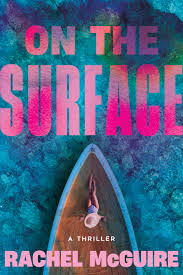Can “citizen detectives” online, like those on Reddit or Websleuths, be helpful to missing persons or homicide investigations? This is one of the elements our debut thriller On the Surface explores.
The internet has amplified our fascination with true crime. Pre-internet, when someone went missing or was murdered there might have been some degree of local citizen involvement — police interviews with potential witnesses, canvassing, or laypeople assisting in searches guided by law enforcement. But now our “community” — and our interest in missing people and crime in general — reaches far beyond what happens in our neighborhoods, towns, or cities. It sometimes even extends past the boundaries of our own countries.
Lee-Ann Whitlock McGuire and I met through a book club (of course!). We were friendly but became closer when we connected over the search for a local young woman. In 2011, a 19-year-old college student (and an acquaintance of Lee-Ann) disappeared one morning on her way to class at a large public university. Her car was found in the parking lot near campus, but she didn’t make it to class. When the police wouldn’t take up the investigation despite the family’s pleas (citing her age and the possibility that she may have left of her own volition), Lee-Ann and I printed up, posted, and handed out fliers with the young woman’s photo and law enforcement contact information. We questioned college students who used the lot where her car was found to see if anyone had seen anything suspicious the morning of her disappearance. We went into the local businesses to see if they had any cameras in or around the area where her car was parked.
Her body was found a few days after she disappeared and her murder remains unsolved.
The internet has both made the average person more aware of these types of crimes, and fueled our collective interest in piecing together the truth of what happened. We want to find the missing, catch the bad guys, find justice for victims. Maybe we believe that understanding motives and methods allows us to protect ourselves and our loved ones from similar fates, or perhaps we simply want to solve the mystery. Invariably we view these cases and the efforts to solve them as entertainment — a natural outgrowth of 20/20 and Dateline and the plethora of true crime series and documentaries.
But the question remains: Can laypeople be helpful to law enforcement and capable of solving missing persons cases, homicides, and other criminal cases? There are forums and websites dedicated to the idea that amateur sleuths can find the truth when law enforcement can’t — but does increased unauthorized involvement, whether in active or cold cases, ever truly help?
There are a few well-known examples of online citizen detectives helping to solve cases:
A woman on Reddit named Layla Betts read about an unidentified man killed in a car crash in Virginia after hitchhiking. The John Doe had two Grateful Dead ticket stubs in his pocket and a star tattoo on his arm. Layla decided to dig deeper by starting a subreddit, where drawings of the unidentified man circulated. The victim’s former roommate reached out and soon, the man was identified by his mother as 19-year-old Jason Callahan.
In August 2021, Gabby Petito, an American 22-year-old travel vlogger, and van life YouTuber went missing on a road trip with her fiancé Brian Laundrie. The story of her disappearance went viral, receiving billions of views. YouTubers Jenn and Kyle Bethune heard about her disappearance through social media and noticed Petito and Laundrie’s van in footage from their dashcam while driving through a national park. They alerted authorities and ultimately their tip led police closer to the location of Petito’s body in Bridger-Teton National Forest.
A group of amateur detectives on Websleuths helped crack the Abraham Shakespeare murder in 2009. Shakespeare won a $30 million lottery in Florida in 2006 and was reported missing years later by family members. When a suspicious person began commenting in a Websleuths forum about the disappearance, group administrators brought it to the attention of law enforcement who were able to match the IP address of the suspicious commenter to that of Shakespeare’s financial advisor, Dee Dee Moore. Law enforcement found Shakespeare’s body in her backyard underneath a fresh slab of concrete.
In the above cases, citizen involvement did yield results. But those instances are the exceptions to the rule.
In other situations in which online sleuths took up a cause, their interest has hampered police investigations and court proceedings. Implausible theories called into tip lines can tax law enforcement resources. Wild, unsubstantiated accusations and rampant rumors posted on forums can muddle the investigation and create additional pain for families already suffering the loss or disappearance of a loved one. Moderators regularly close threads and delete accounts when online theories or accusations go off the rails. People who have lost family or friends to unsolved crimes, or have loved ones suspected of committing those crimes, may have to hear constant speculation about those closest to them, compounding their pain. It’s easy to spread rumors, dox people, and even harass them from behind a keyboard. The internet has created a morass of uncontrolled interference.
These activities can undermine an active police investigation and taint the legal process, impeding justice. Armchair detectives are drawn to the most dramatic possibilities and may ignore more likely, and less sensational, reasons people disappear.
We explore some of these downsides — vigilantism, implausible theories, and wild conjecture in our debut thriller On the Surface. When our character Dani Fox, a twenty-something YouTube influencer, disappears one night in the Bahamas after a cruiser party, her disappearance goes viral — and the police, internet sleuths, and cruiser community all have theories about what happened. Public perception of the crime and uninvited outside involvement impacts the investigation and the outcome.
Have online crime forums and their members helped solve crimes? Yes, albeit infrequently. And in some instances public pressure may increase the resources law enforcement brings to a case that has caught the public’s interest. But without moderation, citizen “detectives” and cybersleuths may do more harm than good — for both law enforcement investigating crimes and families seeking justice.
***
By Rachel Graham, half of the Rachel McGuire writing duo


















